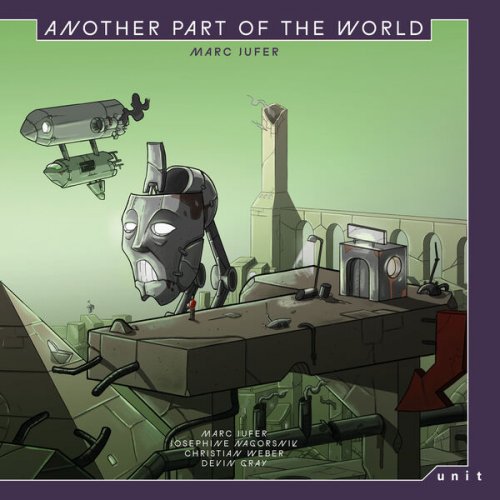Mstislav Rostropovich - The Complete EMI Recordings (26CD BoxSet) (2008)
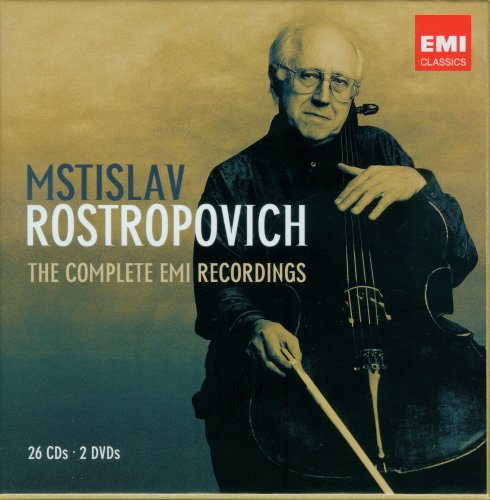
Artist: Mstislav Rostropovich
Title: The Complete EMI Recordings
Year Of Release: 2008
Label: EMI Classics
Genre: Classical
Quality: APE (image+.cue,log,scans)
Total Time: 27:43:12
Total Size: 6.7 Gb
WebSite: Album Preview
Tracklist: Title: The Complete EMI Recordings
Year Of Release: 2008
Label: EMI Classics
Genre: Classical
Quality: APE (image+.cue,log,scans)
Total Time: 27:43:12
Total Size: 6.7 Gb
WebSite: Album Preview
This is the second gargantuan box set devoted to a great string player with which I’ve grappled over recent weeks. The other was a stupendous, wrist-crushing fifty-one CD box devoted to many great (but obviously not complete) EMI recordings made by Yehudi Menuhin. And here is the other one, a twenty-six CD and 2 DVD set devoted to the complete EMI recordings of Rostropovich as a cellist - no conductorial waters here. What with the riches of the Oistrakh box set from this source and things are looking good for the collection collector.
This one is a rationalisation of a set previously released and which keeps its title, The Russian Years 1950-74, and occupies discs thirteen to twenty-five. The first twelve discs are more canonic, central recordings. There is a single disc of interviews and two DVDs, already released, of the performances of the Bach suites.
I have listened to all the Russian set and have sampled the first twelve disc of the rest, so let’s start with the records that offer the most terra cognita.
The first two discs are given over to the Bach suites and are an audio analogue to the film of the performances contained on the DVDs. The cellist was notoriously reluctant to record them but their omission from his discography would have been so grave as to make these March 1991 tapings necessary, no matter how unconvinced some may have been by them. The third disc gives us the self-directed ASMIF Haydn recordings and the Bernstein conducted Schumann. A ball-by-ball coverage of these items is not really necessary, and so I won’t need to tell you that the Beethoven Triple is here once again and the Brahms Double - both with Oistrakh - as well as the latter with Perlman. Perhaps it’s best to concentrate on slightly more unfamiliar gems from the first twelve CDs. These would include the Brahms Sonata in F with frequent accompanist, the excellent Alexander Dedyukhin and the little collection of pieces they recorded in April 1957 which included Popper, Debussy and Scriabin’s Piatigorsky arranged Etude No.6 No.11. There’s a fine Strauss sonata with Vasso Devetzi from Paris, July 1974 and the Shostakovich Seven Romances on verses by Alexander Blok with Vishnevskaya as well as violinist Ulf Hoelscher and Devettzi once again. The collection is not all about the blockbusting concertos.
Still if that’s your fancy the well known things are here; Miaskovsky and Prokofiev with Sargent, the Dvo?ák with Boult and Giulini, the former strongly to be preferred, Dutilleux with Serge Baudo, Lutos?awski with the composer conducting, the glorious Bloch Schelomo with Bernstein, Gubaidulina’s intractable (to me) The Canticle of the Sun, Strauss’s Don Quixote with Karajan and there’s still a few more things to entice.
Time though to move onto the Russian set, which will be of more immediate interest to those who have yet fully to slake their thirst given Rostropovich’s wide proselytising on behalf of these scores. In the first disc there’s the Allegro - only - of the Beethoven Triple Concerto with Oistrakh and Richter and Kondrashin. This torso serves as an entrée to a strong Schumann and the Variations on a Rococo Theme but these are less exciting than hearing him in Honegger’s concerto - a work launched by Maurice Maréchal, still its leading exponent on record. Rostropovich plays it beautifully but not as idiomatically as the Frenchman and the USSR State is on slightly woolly form. Disc 14 also contains a Don Quixote with Kondrashin which I prefer to the Karajan for its more sympathetic characterisation. There’s a 1964 Miaskovsky concerto with Svetlanov, very similar to the Sargent but wonderful to hear and a world première of Glazunov’s Concerto Ballata, a free-wheeling twenty one minutes, if a touch overlong.
Disc sixteen gives us something weird, a composite performance of Prokofiev’s Symphony-Concerto; the first movement with Israel Gusman was recorded in December 1972 whilst the second and third movements were recorded way back in March 1964 with Rozhdestvensky. But it also disgorges what’s claimed to be the world première, with Richter, of the Prokofiev Cello Sonata in C from March 1950. Both Shostakovich concertos are here - No.1 with Rozhdestvensky and No.2 with Svetlanov and they occupy a single disc. Not inappropriately Britten follows - the first two Cello suites and the World premiere of the Cello Symphony - febrile, trenchant and a must-have. The fact that he didn’t record the Third Suite was, the cellist later admitted, a ‘big mistake’.
Disc 19 goes to the ever fascinating Boris Tchaikovsky. The cellist brings wonderful control and expression to the Solo Suite, not least its Aria. He even copes manfully with the funky instrumentation of the Partita - cello, piano, harpsichord, electric guitar and percussion, and one of the many works dedicated to him in this set. Spooky, bizarre and fascinating. The Cello Concerto owes something to Shostakovich in its sinewy and burlesque lines but is an individual and powerful work. Tischenko’s Concerto is also strangely distributed, in his case for cello, 17 wind instruments, percussion and organ and the work encompasses starkness, melodrama and terse expression. The Aram Khachaturian Concerto-Rhapsody is in a cello and piano version. But Yuzo Toyama’s Concerto is a six movement one - strong Japanese pizzicati and some lyric-melancholic moments too.
Lopes-Graça’s Concerto da camera will have escaped all but the most assiduous of listeners I suspect but its urgent and nervous disposition is well worth seeking out, even if that description doesn’t sound too enticing. I suppose if you want unusual instrumentation you’d go straight to Knipper’s Concerto-Monologue for cello, seven brass instruments and two kettledrums - brilliant brass colloquy and mood shifts in this superb work. Yearning expression and quicksilver dynamism marks out Weinberg’s Concerto, cast in broadly Shostakovich-like colouring. Talking of whom he’s the pianist in the undated performance of his own Op.40 sonata that heads disc 22. It’s followed by a small roster of composer-executants. Kabalevsky accompanies Rostropovich in his B flat sonata in a world premiere performance made before the work’s final revision and publication. Then Karen Khachaturian appears, to lend his support in his own Sonata. This is a selection so self-recommending it hardly needs stating.
The last three discs offer more compact rewards with a series of glorious miniatures. There’s a slow and glorious Après un rêve, an evocative Milhaud Saudades do Brasil and a Popper Dance of the Elves to contrast with the version from Abbey Road in 1957. There are bigger things here as well - the Chopin sonata and Miaskovsky Second Sonata, both with the tremendous and underrated Dedyukhin. I’m afraid that no one on God’s green earth will supplant my love of the latter performance - no one will ever play it better. We can also feast on Shaporin’s lovely, melancholic Five Pieces Op.28 even as we ponder Ustvolskaya’s Grand Duet (Alexei Lubimov) and Schnittke’s Second Sonata - important works and as with so many dedicated to the Great Instigator himself.
New music, canonic repertory, multifaceted; a force - spiritual, musical, human - for good, Rostropovich is here captured in some of his many guises. A review such as this can only hope to suggest a small fraction of the rewards to be encountered, but it should also alert us all to the debt owed this indefatigable and remarkable man, whose playing so graced and profoundly illuminated the second half of the twentieth century and beyond -- Jonathan Woolf
This one is a rationalisation of a set previously released and which keeps its title, The Russian Years 1950-74, and occupies discs thirteen to twenty-five. The first twelve discs are more canonic, central recordings. There is a single disc of interviews and two DVDs, already released, of the performances of the Bach suites.
I have listened to all the Russian set and have sampled the first twelve disc of the rest, so let’s start with the records that offer the most terra cognita.
The first two discs are given over to the Bach suites and are an audio analogue to the film of the performances contained on the DVDs. The cellist was notoriously reluctant to record them but their omission from his discography would have been so grave as to make these March 1991 tapings necessary, no matter how unconvinced some may have been by them. The third disc gives us the self-directed ASMIF Haydn recordings and the Bernstein conducted Schumann. A ball-by-ball coverage of these items is not really necessary, and so I won’t need to tell you that the Beethoven Triple is here once again and the Brahms Double - both with Oistrakh - as well as the latter with Perlman. Perhaps it’s best to concentrate on slightly more unfamiliar gems from the first twelve CDs. These would include the Brahms Sonata in F with frequent accompanist, the excellent Alexander Dedyukhin and the little collection of pieces they recorded in April 1957 which included Popper, Debussy and Scriabin’s Piatigorsky arranged Etude No.6 No.11. There’s a fine Strauss sonata with Vasso Devetzi from Paris, July 1974 and the Shostakovich Seven Romances on verses by Alexander Blok with Vishnevskaya as well as violinist Ulf Hoelscher and Devettzi once again. The collection is not all about the blockbusting concertos.
Still if that’s your fancy the well known things are here; Miaskovsky and Prokofiev with Sargent, the Dvo?ák with Boult and Giulini, the former strongly to be preferred, Dutilleux with Serge Baudo, Lutos?awski with the composer conducting, the glorious Bloch Schelomo with Bernstein, Gubaidulina’s intractable (to me) The Canticle of the Sun, Strauss’s Don Quixote with Karajan and there’s still a few more things to entice.
Time though to move onto the Russian set, which will be of more immediate interest to those who have yet fully to slake their thirst given Rostropovich’s wide proselytising on behalf of these scores. In the first disc there’s the Allegro - only - of the Beethoven Triple Concerto with Oistrakh and Richter and Kondrashin. This torso serves as an entrée to a strong Schumann and the Variations on a Rococo Theme but these are less exciting than hearing him in Honegger’s concerto - a work launched by Maurice Maréchal, still its leading exponent on record. Rostropovich plays it beautifully but not as idiomatically as the Frenchman and the USSR State is on slightly woolly form. Disc 14 also contains a Don Quixote with Kondrashin which I prefer to the Karajan for its more sympathetic characterisation. There’s a 1964 Miaskovsky concerto with Svetlanov, very similar to the Sargent but wonderful to hear and a world première of Glazunov’s Concerto Ballata, a free-wheeling twenty one minutes, if a touch overlong.
Disc sixteen gives us something weird, a composite performance of Prokofiev’s Symphony-Concerto; the first movement with Israel Gusman was recorded in December 1972 whilst the second and third movements were recorded way back in March 1964 with Rozhdestvensky. But it also disgorges what’s claimed to be the world première, with Richter, of the Prokofiev Cello Sonata in C from March 1950. Both Shostakovich concertos are here - No.1 with Rozhdestvensky and No.2 with Svetlanov and they occupy a single disc. Not inappropriately Britten follows - the first two Cello suites and the World premiere of the Cello Symphony - febrile, trenchant and a must-have. The fact that he didn’t record the Third Suite was, the cellist later admitted, a ‘big mistake’.
Disc 19 goes to the ever fascinating Boris Tchaikovsky. The cellist brings wonderful control and expression to the Solo Suite, not least its Aria. He even copes manfully with the funky instrumentation of the Partita - cello, piano, harpsichord, electric guitar and percussion, and one of the many works dedicated to him in this set. Spooky, bizarre and fascinating. The Cello Concerto owes something to Shostakovich in its sinewy and burlesque lines but is an individual and powerful work. Tischenko’s Concerto is also strangely distributed, in his case for cello, 17 wind instruments, percussion and organ and the work encompasses starkness, melodrama and terse expression. The Aram Khachaturian Concerto-Rhapsody is in a cello and piano version. But Yuzo Toyama’s Concerto is a six movement one - strong Japanese pizzicati and some lyric-melancholic moments too.
Lopes-Graça’s Concerto da camera will have escaped all but the most assiduous of listeners I suspect but its urgent and nervous disposition is well worth seeking out, even if that description doesn’t sound too enticing. I suppose if you want unusual instrumentation you’d go straight to Knipper’s Concerto-Monologue for cello, seven brass instruments and two kettledrums - brilliant brass colloquy and mood shifts in this superb work. Yearning expression and quicksilver dynamism marks out Weinberg’s Concerto, cast in broadly Shostakovich-like colouring. Talking of whom he’s the pianist in the undated performance of his own Op.40 sonata that heads disc 22. It’s followed by a small roster of composer-executants. Kabalevsky accompanies Rostropovich in his B flat sonata in a world premiere performance made before the work’s final revision and publication. Then Karen Khachaturian appears, to lend his support in his own Sonata. This is a selection so self-recommending it hardly needs stating.
The last three discs offer more compact rewards with a series of glorious miniatures. There’s a slow and glorious Après un rêve, an evocative Milhaud Saudades do Brasil and a Popper Dance of the Elves to contrast with the version from Abbey Road in 1957. There are bigger things here as well - the Chopin sonata and Miaskovsky Second Sonata, both with the tremendous and underrated Dedyukhin. I’m afraid that no one on God’s green earth will supplant my love of the latter performance - no one will ever play it better. We can also feast on Shaporin’s lovely, melancholic Five Pieces Op.28 even as we ponder Ustvolskaya’s Grand Duet (Alexei Lubimov) and Schnittke’s Second Sonata - important works and as with so many dedicated to the Great Instigator himself.
New music, canonic repertory, multifaceted; a force - spiritual, musical, human - for good, Rostropovich is here captured in some of his many guises. A review such as this can only hope to suggest a small fraction of the rewards to be encountered, but it should also alert us all to the debt owed this indefatigable and remarkable man, whose playing so graced and profoundly illuminated the second half of the twentieth century and beyond -- Jonathan Woolf
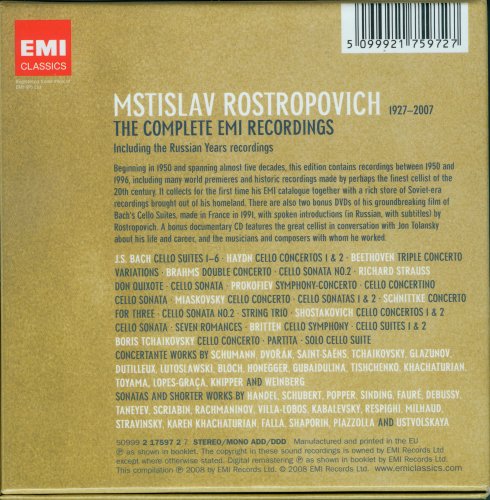
DOWNLOAD FROM ISRA.CLOUD
Rostropovich The Complete EMI Recordings 08 0104.part1.rar - 900.0 MB
Rostropovich The Complete EMI Recordings 08 0104.part2.rar - 900.0 MB
Rostropovich The Complete EMI Recordings 08 0104.part3.rar - 900.0 MB
Rostropovich The Complete EMI Recordings 08 0104.part4.rar - 900.0 MB
Rostropovich The Complete EMI Recordings 08 0104.part5.rar - 900.0 MB
Rostropovich The Complete EMI Recordings 08 0104.part6.rar - 900.0 MB
Rostropovich The Complete EMI Recordings 08 0104.part7.rar - 900.0 MB
Rostropovich The Complete EMI Recordings 08 0104.part8.rar - 514.0 MB
Rostropovich The Complete EMI Recordings 08 0104.part1.rar - 900.0 MB
Rostropovich The Complete EMI Recordings 08 0104.part2.rar - 900.0 MB
Rostropovich The Complete EMI Recordings 08 0104.part3.rar - 900.0 MB
Rostropovich The Complete EMI Recordings 08 0104.part4.rar - 900.0 MB
Rostropovich The Complete EMI Recordings 08 0104.part5.rar - 900.0 MB
Rostropovich The Complete EMI Recordings 08 0104.part6.rar - 900.0 MB
Rostropovich The Complete EMI Recordings 08 0104.part7.rar - 900.0 MB
Rostropovich The Complete EMI Recordings 08 0104.part8.rar - 514.0 MB
![Stephen Parisi Jr. - Buddy! (2026) [Hi-Res] Stephen Parisi Jr. - Buddy! (2026) [Hi-Res]](https://img.israbox.com/img/2026-02/20/fvrxk8mfalmhx2kjnbwaetofm.jpg)
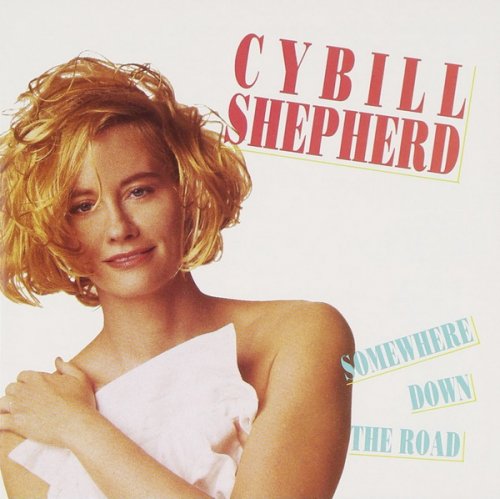
![Susie Philipsen - Sunday Kissing Club (2026) [Hi-Res] Susie Philipsen - Sunday Kissing Club (2026) [Hi-Res]](https://www.dibpic.com/uploads/posts/2026-02/1771738386_500x500.jpg)
![The Three Seas - Antaḥkaraṇa (2026) [Hi-Res] The Three Seas - Antaḥkaraṇa (2026) [Hi-Res]](https://img.israbox.com/img/2026-02/19/uhghtg21m4gkq8nt8lyl1f5dq.jpg)
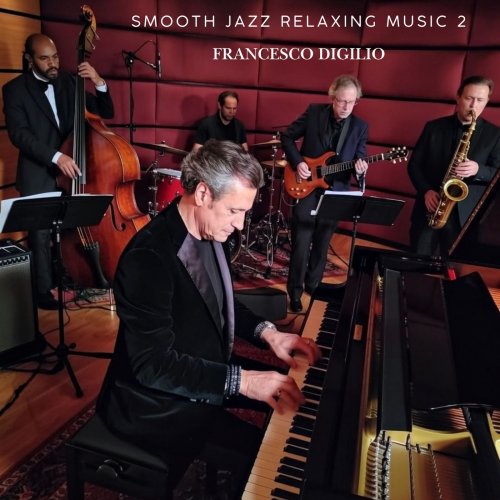
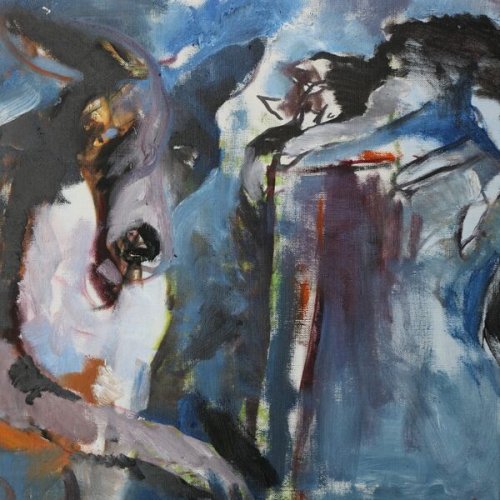
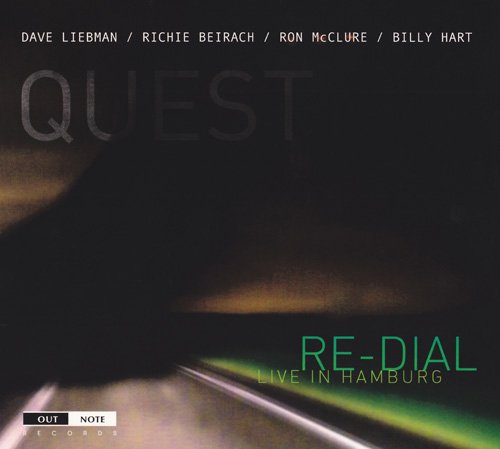
![Acid Mothers Reynols, Acid Mothers Temple, Reynols - Vol. 3 (2024) [Hi-Res] Acid Mothers Reynols, Acid Mothers Temple, Reynols - Vol. 3 (2024) [Hi-Res]](https://img.israbox.com/img/2026-02/21/vgzin7mjpuc9xi8v2ce3z1jc8.jpg)
